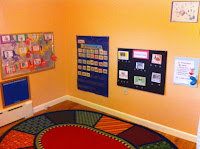I rarely use this blog to rant about personal preferences, but this topic is one that has my blood boiling lately. If you work in childcare or any education field I'm sure you have noticed the lack of manners and respect amongst today's children! And quite frankly, I'm disgusted with it! Each day, I am constantly told "NO!", yelled at, ordered around and screamed at by three, four and five year old preschoolers. I watch my preschoolers order their parents around and I watch parents obey like scared puppies. What really makes me angry are the parents who think it is cute and funny that their child is acting "like a little grown up" or "a little diva." Are you kidding me?? It may be cute to the parent, but to the teacher who is getting paid less than a teenager working at McDonalds and has had to listen to that smart mouthed rudeness for the past nine hours, it isn't cute and it isn't funny. Its disrespectful!!
I'm a firm believer that manners are first learned at home. If a parent lets their child boss them, the main adult in their life, around what makes the parent think their child is going to act any differently towards the other adults in their life? I was no where near a perfect child and I definitely had behavior problems, but I knew better than to be disrespectful to adults. I knew to say 'yes please' and 'no thank you.' And I would NEVER talk back to my parents or teachers. Respect was expected in my home and in my classrooms growing up. I think many teachers today have just learned to accept rudeness and disrespect as something that they can't change. "Its just how kids today are!" How sad!! How sad is it that we parents and teachers are so scared of "squashing a child's spirit" that we allow them to talk to adults and peers disrespectfully. We have become more concerned about being a cool parent or a cool teacher than about a child's social well being. When did it become acceptable for a child to scream at, yell at, and hit an adult or peer? When did it become acceptable for children to have such a sense of entitlement that they believe parents and teachers exist to cater to their every need? That three year old ordering you to "tie my shoe" in a cute fumbled accent may seem cute now, but it won't be in fifteen years when he has job and a boss that he doesn't know how to respect. Just because parents cater to their own children, does not mean the world will. And shame on you as a parent if you expect it to!
I'm not saying that adults have to crush a child's self esteem or talk down to children to get respect. That is not how respect is taught! Respect is best learned through example. Children can be taught to respect others without being disrespected themselves. You can talk to a child respectfully and you should expect them to talk to you the same way. Adults do not have to be dictators or authoritative to garner respect from children, they can simply not tolerate disrespect from children and then in turn show respect for the child and others. When a child orders me to "zip me up now!" or says "no I don't want to!" I ignore them! You may be thinking, oh no ignoring the child will make them feel badly or that it isn't respectful to the child to ignore them. I disagree. Why would I give attention to a behavior that I do not want to see? I refuse to remind my students to say "please," because children are not parrots! They may say please when told to, but they are not saying it with respect, they are saying it because they were ORDERED to (see where I'm going here?) My ignoring of the child's disrespect doesn't last long, most of my kids know me well enough to know what I'm waiting for and they will ask me to help them in a respectful way. Often I will take the opportunity to talk to the child about what happened. I let them know, in a respectful way, that I do not like to be talked to like that. I tell them that it hurts my feelings. Sometimes, I tell them that it makes me feel angry when they talk disrespectfully to me. (If you want a child to talk to you about their feelings, you should talk to them about yours. Newsflash, they know you're angry anyway.)
As I said earlier, respect and manners are learned behaviors. Just like children aren't born knowing how to walk or talk, they aren't born knowing how to behave or how to respect. Its never too early to teach a child respect. And its never too late to start. In a society where respect among adults is almost nonexistent, shouldn't we want a different society for our children when they become adults?
Lesson of the day: Children are watching and learning from us adults! What behaviors are we teaching them?






















